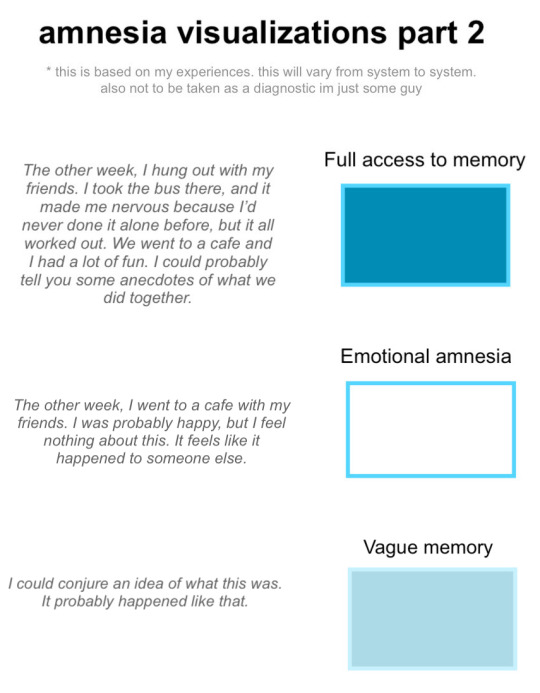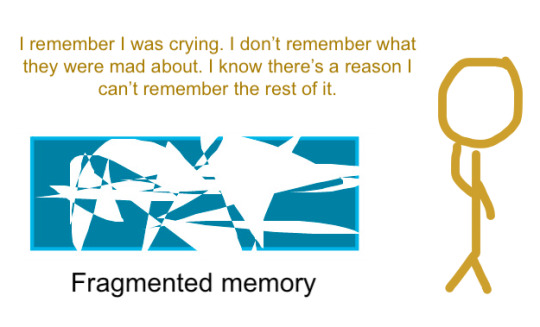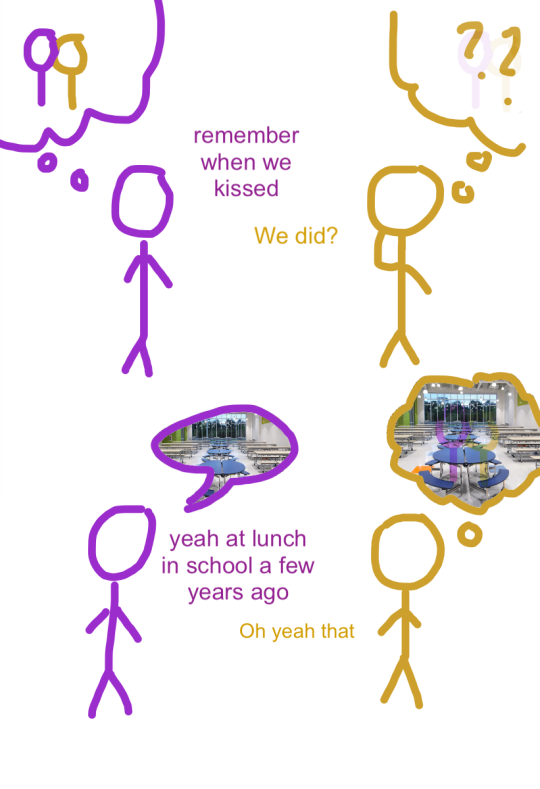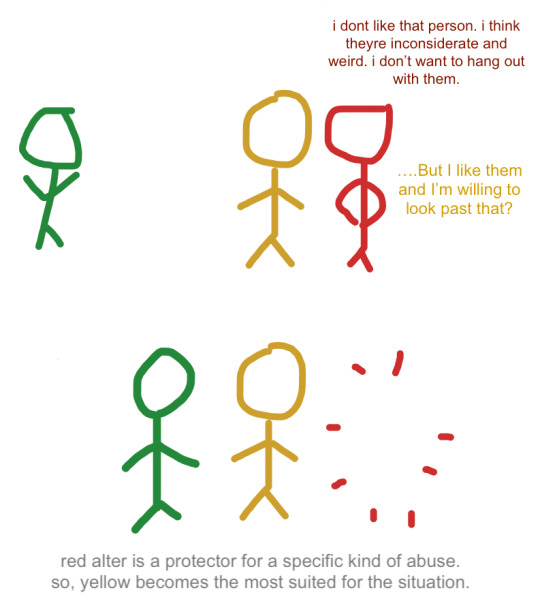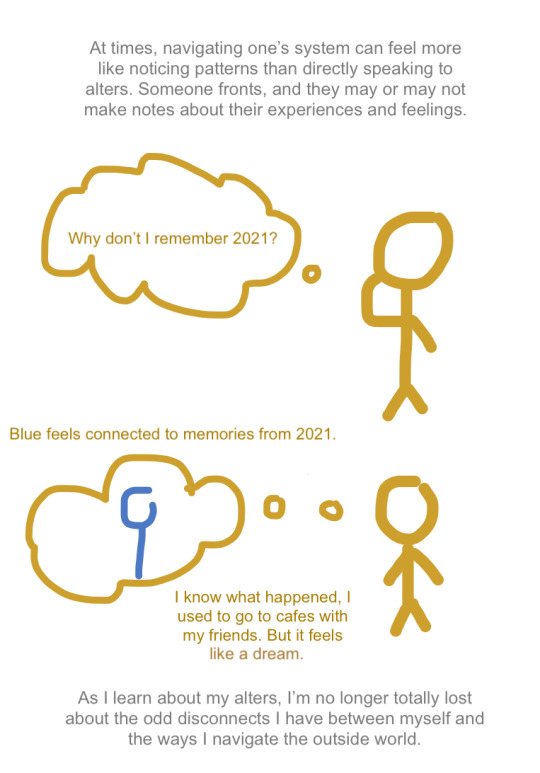Text
I am so so SO sick of ppl calling anti/anti-anti discourse “purity culture”
“Purity culture” refers to the EXTREMELY misogynistic and very often predatory treatment of women’s (mainly teenagers) sexuality in evangelical churches and conservative cults.
It’s a very specific system of abuse and it is NOT ur term to use for when someone rightfully tells you to stop writing rpf abt teenage actors
5K notes
·
View notes
Text
when people say not to be "weird" about pwCDDs (complex dissociative disorders*), they mean:
do not base your assumption of what CDDs look like off of popular media.
do not speak over pwCDDs when they share their experiences.
do not "fake-claim" someone - meaning, do not accuse someone of faking their disorder. this is unhelpful, & unless you know everything they have been through & everything going on in their mind (which you do not), you have no authority to claim that they are faking.
do not judge those with CDDs based off the types of alters they have.
do not treat alters that are not the host part like they are lesser than.
do not assume that pwCDDs can control their switches. also do not assume that they have no control - every person is different.
ask before referring to someone as "plural", "multiple", a "system", etc. everyone has different preferences for the language used to describe their experiences.
ask them how they would like to be treated.
do not pry into their trauma-history or ask any sort of invasive question that you wouldn't ask someone without a CDD.
do not feel as if you are entitled to know EVERYTHING about the person. they are allowed to share what they want, when or if they want.
remember that CDDs present differently in different people. if you have two friends with CDDs, their experiences can be wildly different & still both be valid.
feel free to add on with what you believe should be proper etiquette when interacting with someone who has a CDD! 🤍
*complex dissociative disorders: an umbrella term to refer to dissociative disorders such as DID, OSDD1, P-DID & (some cases of) UDD, where "alternate self states" - or "alters" - are present.
EDIT: please feel free to share this even if you do not have a CDD! the more people who are aware, the better.
272 notes
·
View notes
Text
I didnt know it had to be said but. Do not encourage fucking children who have no form of support other than the internet to try and figure out their programming. Do not encourage children still in abusive environments to try and get programmed alters to front to ''figure things out''. You are endangering children. You are aiding abusers. If you're an 'education account', and any of your content involves telling people you know nothing about to get dangerous alters to front, you should not be educating anyone. (If you haven't been in therapy or started deprogramming, you shouldn't be educating anyone, either.)
These things need to be done in controlled environments with a therapist, who has already spent time working with you and your system, and in some cases somebody else in the room if the alter has a chance of trying to hurt themself or somebody else. Not done by a 14 year old alone in their bedroom following a strangers advice. Do better.
18 notes
·
View notes
Note
hey, saw ur reblog about the legion sys on tiktok and wanted to hear you maybe expand on that post? or share ur thoughts on them?
i’ve liked them for a while but started to slowly dislike them since they unfollowed us + made us unfollow them for simply sharing that smth made us uncomfortable (which is fair, curate ur online space, but it was a bit silly imo) and i’ve heard that they have very radfem like takes (not 100% sure) and that reblog has made me curious as to other things people have to say abt them
-🪐🫀
The comments under this post that talks about why they’re not a good resource:
If I can find it, I’ll link severed-childhood’s take on Legion’s Alpha to Omega document in a separate post :)
8 notes
·
View notes
Text
i dont think people have an awareness that you cant deprogram alters you dont have at least some sort of sympathy for. they are literally parts of yourself. if they do not feel loved, understood, or cared for, they have genuinely no reason to recover. you cant dangle in front of their face, "do the hardest thing youve ever done in your life, THEN ill love you," because thats what their handlers did, that is not going to lead to deprogramming, thats just going to lead to more in-system conflict.
71 notes
·
View notes
Text
a reminder that the host isn’t the only person in the system who should be respected and made to feel comfortable.
the host is not ‘the important part’, we are all completely conscious and capable of our own thoughts, feelings and our own boundaries. our brain created us because it decided that we are all important and needed.
the host is not the only member of a system you should care about.
838 notes
·
View notes
Text
Plural tip for systems that track fronts; be lenient on tracking who may be active. Like, this is your brain, not the tax office. You don't have to perform a bunch of extremely specific checks just to make sure a headmate is truly active; you can just acknowledge their presence in whatever form that may take. Trust that they'll talk to you if they want something, and just let yourselves be. Even if they don't do anything, it still gives them history. Your headmates will appreciate having a place in your system's history, even if they don't remember exactly what they did or said in every single instance.
And even your front history isn't entirely accurate? They'll likely still appreciate that you think about them.
415 notes
·
View notes
Text
Types of Amnesia
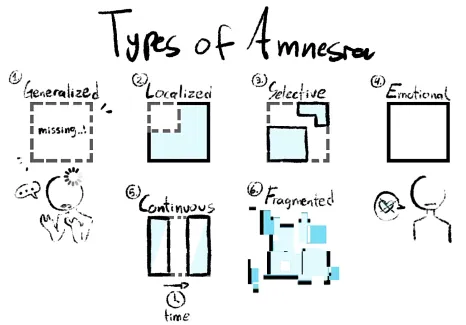
Diagram created by me
General criteria for amnesia:
Memory loss
Confusion
Inability to recognize familiar figures/places
Difficulty recalling names or places
Not remembering where you went
Worser ability to remember things that had happened
Generalized Amnesia
Where a person completely forgets everything about themself and have no recollection of what, where, and who they spoke to. This can describe a blackout switch and may still recognize who they are.
Localized Amnesia
Where a person is unable to recall a specific/series of event from the whole, which creates an incomplete picture of the situation. For example, remembering childhood but not the abuse.
Selective Amnesia
Where a person only lost some and retain the rest, forgetting parts yet not all of them. This can describe greyouts as it grasps some information/sensory yet not enough to tell what exactly happened. One example is playing the phone and unable to recall what occured, only to jump its memory right to being at bed.
Emotional Amnesia
Where a person has an intact memory and it's details on what had happened, but do not remember what the event feels like (e.g. was scared, happy, etc.). One description is that you're watching something that didn't happen to you, because you don't feel like being in the scene itself.
Continuous Amnesia
Where a person fails to retain full parts of the event/day, for a set period of time (can vary from minutes to days) and create an accumulative, small bits of selective amnesias, continuously, leaving many gaps in a chronological timeline. This usually happens in times or stress, or abuse.
Fragmented Amnesia
Where a person has an unrelated, and/or disjointed memories that does not go with the timeline's order, creating confusion and difficult to grasp the cohesive picture of what truly happened. Emotional amnesia may be present in this type.
Bonus for systems:
Amnesia barriers
Where a person fronting is not able to recall other alter's memories, which is a form of retrograde amnesia and compartmentalization. Because the fronter will only retain any information before switching out with the next one, the rest experiences anterograde amnesia as it cannot form and remember those memories, unless being coconcious or cofronting (even though, this is not always guaranteed).
Take notes that amnesia can still happen outside system things due to comorbidities like anxiety disorders or depression, this does mean systems are bound to experience more amnesia compared to non-systems folks out there.
Do you have any discussions about this? Or would like to describe your own way of seeing these different types of amnesia? Or have more to add? Feel free to tell them here!
- j
1K notes
·
View notes
Text
Incest Survivor Resource List
I created this list because I haven’t seen anything else like it. I didn’t want it to be a big dump of links so I added little descriptions to each one so you can better find what you’re looking. I don’t really know what to say other than “you’re not alone” and “it’s going to be okay” and also “hi you have a safe place on my blog if you want to follow it but it’s okay if you don’t.”
You don’t have to be an incest survivor to use these resources, also. Hopefully this list can be helpful to everyone. Please share and boost it if you can!
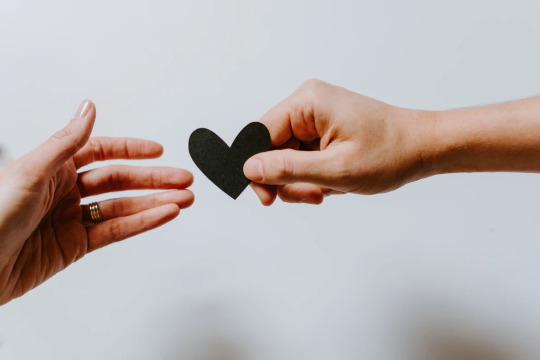
Websites to check out:
Note: All of these spaces are inclusive of LGBTQ+, POC, disabled, and other marginalized communities.
Survivors of Incest Anonymous: A self-help recovery group modeled after Alcoholics Anonymous. To become a member you must be a survivor who is 18 years or older.
Incest AWARE: Has a wealth of survivor-centered resources, especially focused on survivors from marginalized communities. I really appreciate their inclusivity.
Rape, Abuse, & Incest National Network: The nation’s largest anti-sexual violence organization. Operates the national sexual assault hotline. You will find LOTS of information and resources on this website.
What’s Okay: A website & helpline for teens and young adults. Have all of your questions about “what’s okay” when it comes to sex, healthy relationships, and sexual trauma answered with no judgement at all.
Stop It Now (UK version): A child protection charity that provides support, information, and resources on preventing child sexual abuse and keeping children safe. This is a great resource to learn about warning signs of abuse & other concerning behavior. This organization also provides support services to people who are concerned that they might harm a child.
For Ourselves: Reworking Gender Expression: Provides services and support for transgender/nonbinary people who have experienced any sort of violence or crime. Check out their resources for trans/nb survivors of sexual violence in particular. 🏳️⚧️
1 in 6: Resources, information, and support specifically for male-identifying survivors of sexual abuse. While the focus is on child sexual abuse, they also provide support to men who experienced SA in adulthood. They have a weekly support chat, facilitated by a counselor.
Sibling Sexual Trauma: This site provides resources for those affected by sibling sexual trauma. There’s a ton of information and recovery resources here for everyone.
Beauty After Bruises: Dedicated to helping survivors of childhood trauma receive funding and access to therapeutic support. You can apply for a grant if you are in need. They also have a blog that teaches self-help and coping techniques! It’s one of my favorites.
After Silence: Speak about your experiences anonymously and support others anonymously.
Basic information:
What is incest?
Research & statistics on incest
What is COCSA?
What is sibling sexual trauma?
What is emotional incest?
What is secure & insecure attachment?
What is dissociation?
Warning signs of child grooming / adult grooming
Signs of childhood trauma
In recovery:
Recovering From Incest: If you don’t know what to check out first, I recommend starting here. 🖤
How to Heal From Covert Emotional Incest: (TW) The author shares her story of surviving emotional incest. At the end, you will find a list of books & videos that she found helpful for healing from this type of trauma.
Get Self Help: Probably the largest database of self-help resources I’ve ever found! There’s worksheets, pdfs, videos, audio, all kinds of tips and tricks. Go to this page and click on the subject that you need self-help advice for.
Transgender Sexual Violence Survivors: A Self-Help Guide to Healing and Understanding: SO GOOD. There’s TONS of information & resources here. It’s created by trans/nb people for trans/nb people, and it’s completely free. Please pick this one up! 🏳️⚧️
Advice Column: This column offers advice on multiple topics related to preventing and recovering from child sexual abuse. You can also submit your own questions, although I don’t know how quick they are to respond. EDIT: They usually respond in a few days!
Coping skills for complex trauma & dissociation: This link leads to a tag on Beauty After Bruises’ blog. Something I like about their blog is that it’s both informative and also casual. It’s written by someone with DID, and you can really feel that they understand what you’re going through. I found their post on nightmares especially useful!
Safety & Prevention: There are several articles here that give tips on how to stay safe as a survivor, such as what consent looks like and how to protect yourself on social media.
Consent: Even if you feel like you already know what healthy consent is, I recommend reading these pages. I love how they broaden the topic to be about more than just sex.
Sexual Safety At Home: Lots of good, important resources here about safe and healthy sex/sexual behaviors. Learn the GREEN FLAGS of sexual behavior!
What might be behind your physical pain: GREAT article from an incest survivor on chronic pain with “no known cause”.
Healing the inner child after incest abuse: Learn what an inner child is, how incest affects it, and how you can heal through reparenting. (TW) This one has some brief personal accounts of the author’s trauma.
Why survivors miss abuse: An article about why survivors might sometimes miss or crave being abused. I felt like it was a bit lacking but it’s still a good introduction to this topic.
Needing support right now:
National Sexual Assault Hotline: Call the number or online chat. There are also other hotlines & resources listed here.
What’s Okay Helpline: Call, online chat, and email counselors any questions you have about sex and relationships. There is also a large FAQ to check out!
Other Hotlines: This is just a big list of other hotlines that you can call, text, or chat in to receive support.
7cups: I love this website because you can talk to volunteers about basically any sort of non-crisis situation. Get advice or comforting words or just have someone to vent to. It’s free, but you can get access to mental health professionals if you pay.
Just for teens: Resources and support for teens who have or are currently experiencing incest or other sexual trauma.
How to get help & stay safe with an abusive family: These coping and safety tips are geared towards minors who are living with an abusive family. It can be useful for anyone, though!
Supporting a loved one:
TALK: A good starting place for supporters! 🖤
How to support a survivor: Very good advice and helpful links here. Pay attention to the points about marginalized survivors.
A guide for partners & friends of trans sexual violence survivors: MOST INFORMATIVE THING YOU WILL EVER READ! 🏳️⚧️
Helpful literature + more:
Books & films aimed at male survivors: These resources are aimed at men, but they can be useful for everyone. Content is divided into different columns so you can easily find what you’re looking for. They are upfront about how they select what they recommend. Each recommendation has a description about why they recommend it. GREAT RESOURCE.
Reading resources on childhood sexual trauma: These resources focus on preventing childhood sexual trauma & also healing from it. Literature is divided into different columns for professionals, supporters, adult survivors, and child survivors. There is also a section for research if you’re interested in that!
Books, children’s Books, & podcasts: These have all been recommended by survivors of incest & other sexual trauma. Only the children’s books & podcasts have descriptions.
SIA’s downloadable literature: These resources are aimed at adult survivors of childhood sexual abuse, especially incest. I haven’t read any of these yet but the prices are very cheap!
Recommended books on complex trauma: The books are divided into different columns, and all have short but good descriptions. Check out the column on books regarding trauma’s intersection with race, sexuality, and gender!
Carolyn Spring’s column on child sexual abuse: Carolyn Spring is an author, trainer, and trauma survivor who has DID. Anyone who experiences dissociation will probably find her articles very relatable but also highly informative!
Books about healing PTSD, Complex PTSD, and Dissociative Disorders: Everything is categorized so you can easily find what you’re looking for. They have short descriptions for each book. There is also a section for free resources!
RAINN Bookstore: These are books written by other survivors. This is a great place to go if you want to support fellow survivors or hear their stories.
Online Literary Magazine for survivors of sexual trauma: Read art, poetry, and stories from other survivors in this online magazine. It’s free!
Free trauma resources: These downloads were created by Carolyn Spring specifically for trauma survivors & professionals who work with them. I got the e-book and it’s been very helpful!
Free trauma & dissociation books: There’s some good ones here!
835 notes
·
View notes
Note
Do you have credible sources for cult abuse / ritual abuse? Because 99% of the stuff I've seen about it has been made up shit during the Satanic Panic. What cults are responsible for the abuse?
(Hope not coming off as mean or anything; genuinely curious!)
I think one thing to realize here is that "cult" is a loaded word with many connotations and a long history in this context. When people think of a cult they often think of what they see in the movies or on TV: sensationalized representations of people doing sacrifices or intricate religious rituals. A cult can look like many different things, and in my opinion a cult is any group that scores significantly on the BITE model. My understanding is also that the frequent use of the word "cult" in RAMCOA/OEA/CDD spaces is a holdover from decades ago when "cult" was the main descriptor used for any abusive group. Over the past several years, I have noticed people beginning to use the word "group" over the word "cult".
OEA can happen in many contexts under the banner of many different groups, religions, ideologies, etc. Some people are abused by groups of people from the Catholic Church or the Southern Baptist Convention. Some are abused within the bounds of the Mormon Church / LDS or within Jehovah's Witnesses sects. Some people are abused in smaller, more stereotypical "cult-like" groups like the Twelve Tribes. Some people experience extreme and organized abuse that is not linked to any religion or ideology at all. Abusers are opportunistic after all, and this is not about the religion or ideology portion, but moreso about the opportunity for an abuser to exploit a child. It just so happens that organized religion is an environment in which there are many such opportunities. Some abusers also intentionally twist or bastardize religious concepts in order to further their abuse and manipulate victims. In short, there is no single shadowy Illuminati-adjacent cult that is doing all of this.
Can I ask what you've seen so far? Svali, Fritz Springmeier, Cisco Wheeler, Colin A. Ross, and Ozian are all unreliable sources but unfortunately they are what people tend to stumble upon first when looking into this.
As far as I know, Alison Miller, Ellen Lacter, Michael Salter, and Harvey L. Schwartz are credible. There are others but these are the main four that I usually list. Michael Salter is of particular interest seeing as how he is a professor of criminology and works mainly on the judicial aspect of organized sexual abuse instead of on the psychological aspect of it. He is on the Board of Directors at the ISSTD, but he is also an advisor to Australian and Canadian agencies for child protection.
As I've said in responding to another ask on this blog, once I am less busy in the real world I intend to create a masterpost with a list of credible researchers and resources on the topics that I discuss.
#actually did#actually dissociative#ramcoa#ramcoa survivor#did osdd#did system#dissociation#dissociative identity disorder#dissociative system#osddid
24 notes
·
View notes
Note
Hey there, I've been seeing your posts come across my dash more and I think you have some very interesting posts :)
I have been doing some reading on RAMCOA, mostly academic papers alongside my usual DID and mental health research (Irecommend Jeni Hayne's autobiographical novel "The Girl in the Green Dress" if you haven't read it yet. It's a beautiful autobiography by a system in collaboration with their long term psychiatrist, George Blair. It contains some fascinating discussion on system experience with polyfagmented DID. tws: descriptive SA, abuse, court involvement).
RAMCOA isn't talked about very much, and I'm curious how I can support people who've been through it, along with what it entails/displays as etc.
I haven't managed to find a good definition of what programming entails. As far as I understand, it's the mistreatment of a person with the intention of creating a disassociated personality state.. is that close to it?
And, do you have any suggestions for good resources to learn more of RAMCOA and programming?
Hi there! I'm glad you like the blog.
Thank you for recommending Haynes's autobiography. I was aware of her case and she is such an inspiration to me but I was unaware that she had written a book about it all. I will certainly check it out. On that note, if you are interested in polyfragmentation, I recommend Richard Kluft's work.
Your understanding of programming is accurate. Programming is extreme abuse and extreme conditioning meant to either create a system (with specific alters, structures, behaviors) in a young child who does not yet have DID or to create these specific alters, structures, and behaviors in a child who has already developed DID. Conditioning, Pavlovian and operant, is the basis of all of this and you must understand these forms of conditioning and how they can be taken to an extreme.
As for resources, I recommend the writings of Alison Miller (Becoming Yourself and Healing the Unimaginable), Michael Salter (Organized Sexual Abuse and a litany of other papers and articles-- have a look at his ResearchGate profile, there's really a lot!), and Harvey L. Schwartz (The Alchemy of Wolves and Sheep and Forgotten Voices). These are all specific to RAMCOA/OEA, but I suggest learning about polyfragmentation and conditioning as well as learning about trauma in general. There is a lot of research coming out now about ACE scores + outcomes and what chronic stress and recurring trauma does to the human body by acting on the HPA axis.
I have been very busy these past few months but when things have settled down for me, I intend to make a masterpost or some kind of compilation of resources, books, articles, etc.
#actually did#actually dissociative#ramcoa#ramcoa survivor#did osdd#did system#dissociation#dissociative identity disorder#dissociative system#osddid
15 notes
·
View notes
Note
Hi!
I’m super sorry if this is a weird string of questions, but is it possible to not remember any cues/triggers of programming but still be able to know the difference when you’re dealing with that program?
Do you know any ways to mark down cues/triggers and ways to combat those?
I know therapy is a big thing, but we can’t find any therapists around us that are able to help or say anything about helping with CDDs let alone RAMCOA/OEA.
Hi anon! I want to apologize for taking so long to get back around to this. Real life has been very busy for me as of late.
I don't think it's out of the norm for someone to forget their own cues or to not be able to remember them. It would be very convenient for an abuser for someone not to remember these things.
I am famously pretty bad at keeping track of my own cues but it is definitely a collaborative effort between parts. I think the main thing is to be able to look back on things and recognize patterns, even if it's just "I don't seem to have any memory for this specific period of time". Sometimes if I notice that I don't remember certain things, or dates or events, I am able to ask around inside to see if I can find anyone who does. Once you are able to spot patterns you can start trying to figure out what might cause or influence those patterns. Of course, like anything else in RAMCOA or OEA recovery, this is not something you can rush. Proceed at a pace that is comfortable for you and your parts.
Therapy is a huge thing but I acknowledge that it can be very difficult to find a therapist nearby who has any experience in dissociation at all, let alone organized abuse. I hope you are able to find one eventually and that things go smoothly for you in the meantime.
#actually did#actually dissociative#ramcoa#ramcoa survivor#did osdd#did system#dissociation#dissociative identity disorder#dissociative system#osddid
10 notes
·
View notes
Note
Probably a dumb question but does OEA always have a financial incentive involved?
Not always. Abusers are often opportunistic and just looking for someone to exert power over. It's like how sexual abuse is not always done for overtly sexual reasons-- it's often done because an abuser sees an opportunity to exploit someone.
So, no, OEA is not always financially motivated and as far as I know, mine was not.
#actually did#actually dissociative#ramcoa#ramcoa survivor#did osdd#dissociation#did system#dissociative identity disorder#dissociative system#osddid
6 notes
·
View notes
Text
I kind of miss the days when all people knew about DID was Sybil or "oh, that's like that Split movie". I'd rather have someone jokingly compare me to Split than genuinely doubt my condition because of what they've seen on social media.
#actually did#actually dissociative#ramcoa#ramcoa survivor#did osdd#did system#dissociation#dissociative identity disorder#dissociative system#osddid
160 notes
·
View notes
Note
Not the same anon but we could use the endo terms list to block /nf
All the tags we have blocked, the tags that mention RAMCOA/OEA things are under a cut but also highly recommend blocking!
endo
endo safe
endosafe
endogenic
endogenic system
endos interact
pro endo
proendo
pro rq 🌈🍓
pro rq🌈🍓
prorq 🌈🍓
prorq🌈🍓
pro rq
prorq
proradqueer
radqueer
radqueer coining
rq
rq 🌈🍓
rq🌈🍓
tulpagenic
tulpasystem
nontraumagenicsystem
nontraumagenic system
transharmed
transHarmed
trans harmed
trans Harmed
transid
transID
transid coining
transOEA
transoea
transRAMCOA
transramcoa
transCSA
transcsa
transProgrammed
transProgrammer
transprogrammed
transprogrammer
48 notes
·
View notes
Text
Unorthodox Methods I've Used to Combat Programming
Try dismantling things in the headspace that perpetuate programming. Eg: for us, programs show up in the inner world in many different ways, ranging from machines, to objects on one's person that are out of place and cause negative effects, as Blaine (a gatekeeper) had when he realized one of his accessories ( an ascot with a metal brooch) was causing a scramble program by emitting a signal from it. We can temporarily affect programs by affecting these physical manifestations, taking off the accessory in the previous example, and placing it into a locking container with shielding for radio signals, was able to turn off that program, until and unless a reactivator part brings it back, or uses a different method to turn on the same program, such as activating a backup machine that also triggers that program's function. You may have to fight the same program several times, until you can find and get through to whoever reactivates that program, if applicable.
Use tools. If you've got any control over your inner world, try adding in tools for yourself to use to combat programs and their physical effects or manifestations within the headspace. A lot of our programming involved disrupting communication between alters. So we brought in the idea of communicators, like in Star Trek, and later, Focuses from HZD, as long distance ways to talk to anyone on the network. We give new alters their own device when they become known, and this allows them to speak to each other and even send information across distances in the headspace that used to be impassable (from layer to layer, across sidesystems, etc). We can even write software for them that serves additional functions as needed, so it can be used as AAC, or to find active programming structures through the heads up display. We've also added vehicles in the form of miniature starships that can navigate the large area more easily, and a much larger ship that can make changes to the inner world on large scales like moving layers with its tractor beam.
Try moving people around. When alters are stuck in terrible situations in the headspace, it makes things bad all around. If you can rescue them, and move them to a safe, supervised area with any kind of help they may need based on the state they're in (medical, emotional, Etc), you may be able to get them feeling safer pretty quickly. You may have to do this more than once, I've had parts spontaneously move back before, but keep up with it.
Remember that a headspace is not a fixed entity. It can be molded to you as you grow and change, just as it was molded when you were programmed. Even as it is, the way it's designed was how you interpreted the commands given and visuals shown when it was created, and much of it may be your own design shining through. Just as you made it back then, you have the power to change it now. If you can't yet, keep trying! It's a visualization tool, and it is yours. No one else has jurisdiction over what it looks like or has in it but you. But keep in mind, too big of changes at once, especially if you're not ready for what they represent, won't stick. We've had many that wouldn't, because we hadn't done the work first. Getting rid of program structures you haven't deactivated and processed the trauma of, for example, doesn't work in our experience. But once they're inactive and you remember the programming, why you believed it, and understand, fully, why it was unequivocally fucked up that you were taught that, and the alters affected believe they deserve a life outiside of that job, then it's a lot more possible. You can make your headspace a safe place, one piece at a time.
Just sit with them. Some (for us, most) programmed parts may have little awareness of the small pleasantries of life. This makes giving in to what the programming is telling them very likely, as they have no experience of the alternative. This applies doubly so to programmed persecutors and any alter who's still loyal to the abusers, especially beta programmed parts in our experience. Showing them what is normal and good and pleasant is always a good thing. Let them see what being a person is supposed to be like. Show them what it's like to have agency, let them choose little things at first, then bigger ones. Most of all, let them choose what to do with the body when they're in front. Wear what they want to wear, hide if they want to hide, etc. This is important to them realizing that they should have been able to say no all that time.
Hope this helps someone out there. Feel free to ask questions if you want.
36 notes
·
View notes
